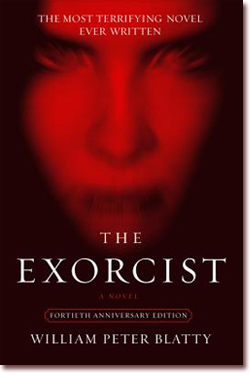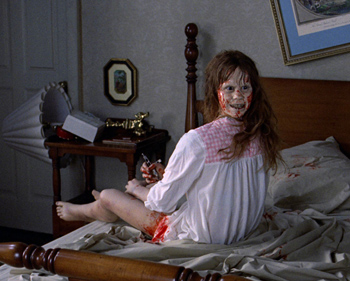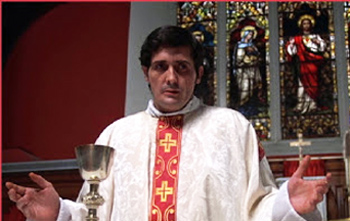Book Reviews
 |
 |
 |
 |
 |
 |
 |
The Exorcist Novel & Movie:
Not Recommended
Book review of The Exorcist by William Peter Blatty (1971) and the 1973 Hollywood horror film derived from it

Hollywood zeroed in on the unsavory tale and filmed it in 1973. The Exorcism became a box-office hit, grossing $441 million, and received 10 Academy Award nominations.
Forty years after the true incident in 1949, an investigating reporter garnered the facts of the actual exorcism that provided the base for Blatty's work of fiction. What actually happened was recorded in the diary of one of the priests involved in the real exorcism.
The room in a St. Louis hospital where the last stages of a months-long exorcism took place had been sealed. When the room was torn down, the diary of the macabre incident fell into the hands of another celebrated author, Thomas B. Alllen, who wrote the true story, titled Possessed.(2)
I don't recommend Blatty's novel or watching Hollywood's version of it. The primary exorcist in the real story, Fr. William Bowdern, S.J., witnessed the Hollywood version and was rightfully disgusted with its theatrical play on the facts. The historical account in the text Possessed, however, is a scholarly read for people who are interested in the occult. The actual 1949 exorcism was a success, and the boy and his family were converted to Catholicism.
Reviewing The Exorcist novel
From reading others stories by Blatty, both fiction and non-fiction, my opinion is that he was not a believing Catholic.The protagonists in Blatty's Exorcist are Fr. Damien Karras, a Jesuit, Chris McNeil, a professional actress and her 12-year old daughter Regan, who became possessed. Fr. Karras is the psychiatric counselor for priests at Georgetown University, but a man who had lost his Faith.

Hollywood dramatizes the possession in the 'horror flick' it produced in 1973
He observes the possessed child, who has taken on grotesque features, voice and countenance. But Fr. Karras's naturalist training at prestigious medical facilities, Harvard, Johns Hopkins, etc., does not let him believe in demonic possession. So, his approach to cure the child is essentially the same as the various doctors who have already attended to the Regan misfortune.
Karras doubts that Regan's possession can be explained except by various disciplines dealing with the human psyche. He exhaustively consults textbooks searching for scholarly explanations on the subject of demonic possessions. He flounders among many variant conjectures in his search of how to apply his psychiatric training to cure the child: hysteria, fraud, mythomania, paranoia, schizophrenia, neurasthenia, suggestion, telepathy, etc.
Consequently, his advice to Regan's mother is to place Regan in an institution for six months of observation. The mother, although an atheist, had been advised by medical professionals that exorcisms have actually worked, "though not for the reasons they think."
As a last hope to save her daughter, the mother pleads for an exorcism before the Diocese. The Chancery sanctions it and commissions Fr. Karras to accompany Fr. Marin in the exorcism. Marin dies of a heart attack during the exorcism, and Karras invites the demon to come into his own soul, which he does. As a result of which, Karras jumps from the window and kills himself.

Fr. Karras who commits suicide at the end is presented as a hero without faith
I believe the whole story is censurable. The development of the exorcism has little to do with reality. The main concern of the author, in my opinion, is to offer a macabre menu to his readers, feeding the general revolutionary tendency of acquainting the public with the presence of the Devil among men. The atmosphere in which the novel unfolds is also anti-Catholic, although unfortunately, none of us is surprised today to find a priest who lost his Faith and is an atheist in practice.
The only positive message I found is that the novel shows the incompetence of modern science to explain a possession. This helps to break the myth - which reached its zenith during the 19th and 20th centuries - that man is capable of resolving everything. This novel confirms that, in face of a demonic possession, human science is useless.
- Harper & Row/Pub/NY, 1971
- Possessed - The True Story of an Exorcism, Thomas B. Alllen, New York: Doubleday, 1993

Posted August 7, 2013
______________________
______________________











